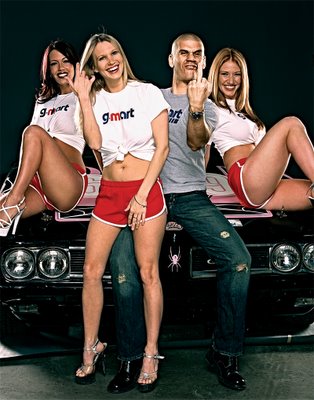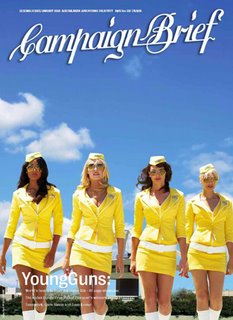Another year clicks over on the odometer of my life. The 43rd.
I don't feel any older. Well not perceptibly. I feel rather sprightly,
actually. The greying hair and thickening waist are simply my
camouflage. A way of blending into the mature world. My inner world is
as creaseless as a cosmetics commercial, not quite so airbrushed but I
certainly feel more capable now than at any time before.
At the launch function of Idealog I spoke about the headhunter who
pronounced me dead, in effect, with the grand insight that, after 40 it
was time to hang up my creative spurs. No self-respecting advertising
agency would hire a creative director as old as me. The remark hardly
phased me. As a matter of self respect I wouldn't hope to work within
the confines of an advertising agency. I left the mainstream of that
business in 1990, which, by my calculations, made me a mere lad of 30. I
walked away from the position of creative director of Young and Rubicam
and its medical division Sudler & Hennessey in disgust. I had never been
in such a non-creative environment. For all of the pronouncements from
on high about 'resisting the usual', it was rarely ever anything but
business as usual. The job of Y&R in this country was to service Colgate
Palmolive as part of the parent organisation's worldwide commitment to
the account. Winning advertising awards was simply a diversion to
distract the creative talent from the fact that we were actually
velveteen rabbits in the cut and thrust of business.
I have to take issue with the concept of 'Creativity' in advertising.
The reality is that advertising agencies make a crucial mistake in their
taxonomy of talent. By siloing creative into a 'department' it indicates
a lack of insight that has made agencies less and less valuable and even
relevant to their client's business. The definition of creativity in an
agency, given that job descriptions tend to be either copywriter or art
director (even creative directors are regarded as copy based or art
based), is consequentially executional or craft oriented. The ability to
come up with an ad concept that is an insightful expression of an idea
(the proposition), cleverly and arrestingly executed is the Holy Grail.
And that is the problem.
Sometimes the answer is not an ad.
Which, in itself is a problem. If the answer is not an ad, then why do I
have all of these velveteen rabbits sitting around reading magazines,
surfing the Internet and watching DVDs of The Prisoner (waiting for a
client on whom to apply the retro chic show's iconography in pastiche
with post modern irony)? Why indeed?
And if I make my income from media commissions, shouldn't we commission
some media - and therefore we'll need 'creatives' to fill the hole?
S'not easy is it? Glad it's not my dilemma.
The cleverest thing I ever did in advertising was to create a template
model. Have a big idea, then run in myriad form for loads of clients,
retain the IP and create a sales and production organisation to stoke
the fires. I invented Family Health Diary in 1996 (admittedly I was
still under 40) and today it is the single biggest advertiser on New
Zealand Television.
The factors that collided to make it a reality were the following:
1) I returned to New Zealand after my first wife's death and did not
have a job. I began toying with the idea of creating a syndicated media
property - where multiple, luxury brands could combine to develop
promotions mutually and reduce the cost for each brand and leverage
their common audiences - in many cases a case of co-opitition. I went a
long way down the path with the product when I met a former colleague,
who introduced me to one of his close friends. We three were all looking
for the next thing in our careers and had been considering similar,
though quite different ways of communicating brand ideas. Brands were
the common thread that stitched us together. We formed a business -
BrandWorld and set out to change the face of the marketing world.
No one was buying. Our ideas and innovations fell on deaf ears - or met
with agreement, but no motivation to change behaviour. The world wasn't
ready for an organisation that orchestrated the brand story for clients,
but did not necessarily execute (the concept of disintermediation was
just beginning to capture headlines in the 'new economy' press).
My partners and I survived by pitching for pharmaceutical accounts.
Isn't it funny how often Drucker is right? He said that most businesses
begin with an intention to occupy a certain space, but usually find
themselves in another as a matter of practicality and meeting market demand.
By becoming, by default, an ad agency I found myself consigned to the
role I had shucked off in 1990 - the creative guy.
And I hated it. I had become the velveteen rabbit of my worst
nightmares. Words and pictures. Worse, I had become sucked into the
vortex of the mid 90's empowerment by computer dilemma. We bought
expensive Macs to create artwork and I found that I had to learn how to
use them at a level above Word and Excel (which had suited me fine until
them - preferring to leave the art function to someone else). But we
were small and it was all hands to the pump. Or rather, …my hands to the
pump.
I would find myself left to develop ideas for pitches and presentations
on the computer, sitting alone in the middle of the night, while my
partners went home to their families and friends. The seeds were sown
for a revolution.
2) A former client called me and invited me to lunch. He then ambushed
me and pitched Amway to me. In my brooding state of frustration it all
sounded good. In fact the message remains with me as one of the most
important philosophical constructs I have ever been exposed to. Listen
carefully, this is important: Trading a dollar for an hour will get you
nowhere. You need to do a job once, and then get paid for it over and
over and over…
I was ready baby. With one exception. I was ready for my wife to do it.
She was looking for something to do with her time. So I volunteered her.
And, as it turned out she was very good at selling cosmetic products.
The seed that Amway sowed lay planted in my subconscious. For better or
worse I am not much of a franchisee. I tend to look for new ways to do
things, or reassign information in a new role. Then it happened. My
partners and I were invited to pitch for a very large drug company's
account to launch a new class of medicine. Big, big budget. It was
important. We were briefed. My colleagues and I talked around in circles
but didn't really arrive at a compelling strategy. The account had some
Australian executions they liked. We adapted them and I set about
developing a brand language for this market. In the space of 48 hours I
doggedly developed hundreds of executions, ranging from ballpoint pens
to vehicle signage, advertising and direct marketing concepts. It was a
marathon and largely performed alone. Once again while my colleagues
were off in a restaurant somewhere, whooping it up.
We won the account. Probably by dint of the sheer volume of work presented.
But there was one small problem.
We had a competitor's account (though it was small and dormant - a drug
that had the rather nasty side effect of causing death in some cases).
"Fire the other brand or you can't have our business'
To my colleagues horror I said "Sure, but you will have to spend more
money with us."
The room fell silent.
"Show us how…"
Now that is the kind of client I like.
3) My wife of the time worked for an ad agency that held the master
account for the consumer products division. I recalled that she had
beefed to me on more than one occasion that she had to work on accounts
that were impossible to make a dollar from because the budgets were too
small. By the time there had been a meeting to brief the agency, some
concepts had been developed and produced there would be no money left
for media. So, $20,000 here, $30,000 there was simply left on the table.
Within the framework of a traditional advertising agency this was just
an annoying fact of life. Their response was to concentrate on the
products and brands with sufficient budget to make the kind of ads the
agency liked to make and ignore the rest. Of course, the fact that the
velveteen rabbits didn't want to touch products for hemorrhoids really
left the back door ajar in a critical strategic mistake that I was quick
to exploit.
Over a weekend I developed the concept for Family Health Diary. As ever
my colleagues were nowhere to be seen and when I pitched it to them they
were somewhat disinterested. In part because of 'not invented here
syndrome' and in part because they felt it was not core business, too
risky, …wouldn't be bought by client. I insisted that we try, at least.
I worked up the presentation and invited the client to our office to
take a look.
I had noticed that the client had displayed a sign on their reception
counter proclaiming that the business would be number 1 in all areas of
it's operation by 2000.
My presentation kicked off with the question: "So, how is it looking for
2000? Will you reach the goal set in your mission statement?"
"It's not looking good."
"So, moving forward incrementally won't change your business enough to
propel you to the next level?"
"That's right."
"What if we could do something different?"
"We need something different."
"Do what you always do, get what you always go, right?"
"That's right."
(At this point everything Amway taught me is clicking perfectly into place).
I demonstrated my concept, an umbrella brand that aggregated many small
budgets to create something with a little more heft and with lower costs
to implement - from conception to production. In fact there were no
conception costs; because the model was that our company retained the
copyright and title to the concept. We would license it to the
participating brands.
"I like it. Come to our next sales meeting at Gulf Harbour; pitch it to
the team. If they like it, we'll trial it."
They liked it, we trialled it. It has become the dominant force in
medical and health advertising in New Zealand. It is so respectable that
the government now uses it, rather than create advertising for things
like bird flu preparedness.
The seeds of my own demise
The epilogue to the story is also a salutary lesson for creators.
By creating an autopilot product I effectively made myself redundant.
The work we put into developing the brand - especially convincing other
brands to come on board was costly. The product did not return
immediately high profits. It also became the staple of the business. The
drug we pitched for was very successfully launched and we relied on
income from the account (amongst other, smaller projects) but the cash
stopped flowing suddenly when budgets were slashed in response to the
product's success. The client reached the PHARMAC funding cap far sooner
than expected and was forced to pay millions to the government. We were
in crisis. Under the stress of losses my colleagues and I began in
fighting over accounts and accountability. I felt that we were
profligate and was vocal in my criticism. Within days I was couped out
of the daily operation of the business and things got ugly.
I lost control of my intellectual property and, ironically the product
that had initially received a luke warm reception became the most
significant asset of the business. I was left in limbo for over a year
while we wrangled over the matter and the valuation of the company. It
was a terrible time for me and contributed to the failure of my marriage
and an enormous, personal financial loss - I had been funding my
participation in the business largely out of my savings - my account
were beginning to show all the signs of an Ethiopian river bed in a bad
year. It was tough. And I learned a series of bruising lessons.
The irony is that I now work with the business again and have developed
a spin-off, Eating Well and another IN2IT (for a general youth audience
- which failed to get traction with ad agencies and clients). We are
looking a new properties and I have no real issue with my former partner
(who also maneuvered our other colleague out of the business).
Let that be a lesson to you.
And - creative people - it's not about ads. It is about intellectual
property. Make sure you look after yours.
(Blows candles out - cut to credits)
David MacGregor
Founder / Creative Director
Idealog magazine
www.idealog.co.nz
P.S. One of the basic principles of the web is: YOU own your words. I
find it remarkable that, on this blog, no-one seems to want to take
credit for their ideas. Hmmm...unlike veleveteen rabbits, usually keeen
to take credit for anyone's ideas.
(c) the author. All rights reserved. No part to be reproduced without
licence agreed with author/copyright owner. ;-)













